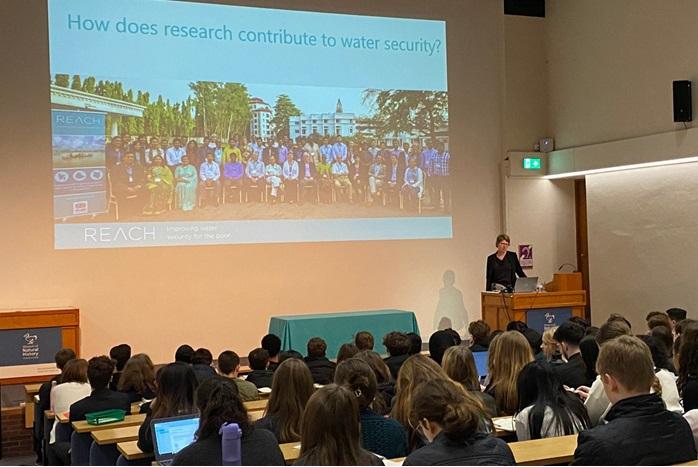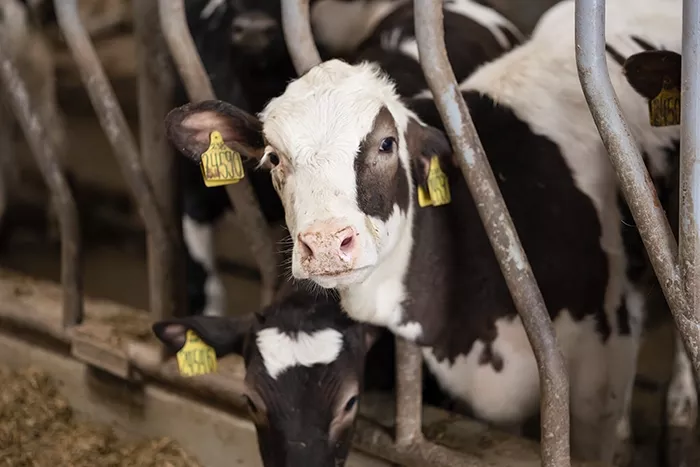In an article for The Conversation, Florian Steig, DPhil candidate at the School of Geography and the Environment, unpacks what Danish climate migration drama, Families Like Ours, gets wrong about rising sea levels.
News
Fair Water? exhibition reaches out to schools
What I love about working with the REACH programme team is their commitment both to education and to using research to address some of the most challenging problems faced by people around the world. These two aspects came together perfectly when the team had the opportunity to share what they are working on with secondary school students at the Fair Water? Exhibition Schools Day last month.

Turning camels into cows: megafarms are being set up to produce camel milk on industrial scales
Dr Ariell Ahearn highlights the shift towards industrialized camel farming due to climate change and increased demand for camel milk. Despite camels' resilience to climate challenges, they are now confined to large dairy farms, posing environmental and cultural risks.

Sensitive interventions to catalyse China’s net-zero transition in energy and transport
The global energy transition could happen sooner than anticipated if sensitive intervention points are used to deliver China’s carbon neutrality policy at the city-level, researchers from the University of Oxford and The Chinese University of Hong Kong have outlined today.

I’ve studied sand dunes for 40 years – here’s what people find most surprising
The Dune films remind us of just how beautiful, mysterious, expansive and changeable sand dunes can be. For centuries these wonderful landforms have filled humans with awe – and in some cases fear and foreboding – because of the apparent remoteness and risks associated with the deserts they are synonymous with. That's what first attracted Professor David Thomas to research deserts and dunes more than 40 years ago, and he has been investigating them ever since. In an article for The Conversation, Prof. Thomas shares five things he has learned that may surprise you about dunes.

Fair Water? The people behind the exhibition
For World Water Day, Emma Schneck interviewed Katrina Charles and Alice Chautard before the launch of their latest immersive exhibition at Oxford’s Museum of Natural History ‘Fair Water?’, showcasing the reality of global water inequality.

SoGE Students Embark on Water Adaptation Photojournalism Research Project
They say that education can take you to far-off places. For a team of five SoGE students, their master’s experience at SoGE led them to embark on a self-driven research expedition across India. The West Bengal Water Project is spearheaded by field team Raphaela Betz (MSc in Water Science, Policy, and Management), William Wallock (MSc in WSPM), Patrick Robichaud (MSc in WSPM), and Susana Higueras (MSc in Nature, Society, and Environmental Governance), as well as Victoria Taylor (MSc in WSPM) helping from afar.

Ashwini Petchiappan wins the Alfred Russel Wallace Prize
2023 MSc graduate Ashwini Petchiappan has won the Alfred Russel Wallace Prize for her dissertation research on The Impact of Climatic Oscillations on Bird Migrations. The prize is awarded once per year by the Examinations Board for the MSc in Biodiversity, Conservation and Management for an outstanding dissertation.

International Women's Day 2024: Who inspires you?
We are marking International Women’s Day – a time to reflect on the progress women have made and their ongoing fight for equality. The theme for IWD2024 is Inspire Inclusion. We asked SoGE students and staff to tell us about women who inspire them, and what they think inclusion means in the context of gender equality. They highlighted the influence and contributions of an incredible range of women, including activists, entertainers, academics, politicians, their own mothers, and many more. Here is what they had to say…

Oxford researchers launch updated carbon offsetting principles
An interdisciplinary team of Oxford University researchers have today released an update to flagship guidance on credible and net zero aligned carbon offsetting, which has been used by hundreds of organisations since its publication in 2020.

Jacobus Petersen wins The Quantitative Methods Research Group (QMRG) Undergraduaute Dissertation Prize
The Royal Geographical Society with The Quantitative Methods Research Group (QMRG) has named Jacobus Petersen as the winner of their 2023 undergraduate dissertation prize. Jacobus recently graduated from the BA in Geography course at the University of Oxford's School of Geography and the Environment (SoGE).








